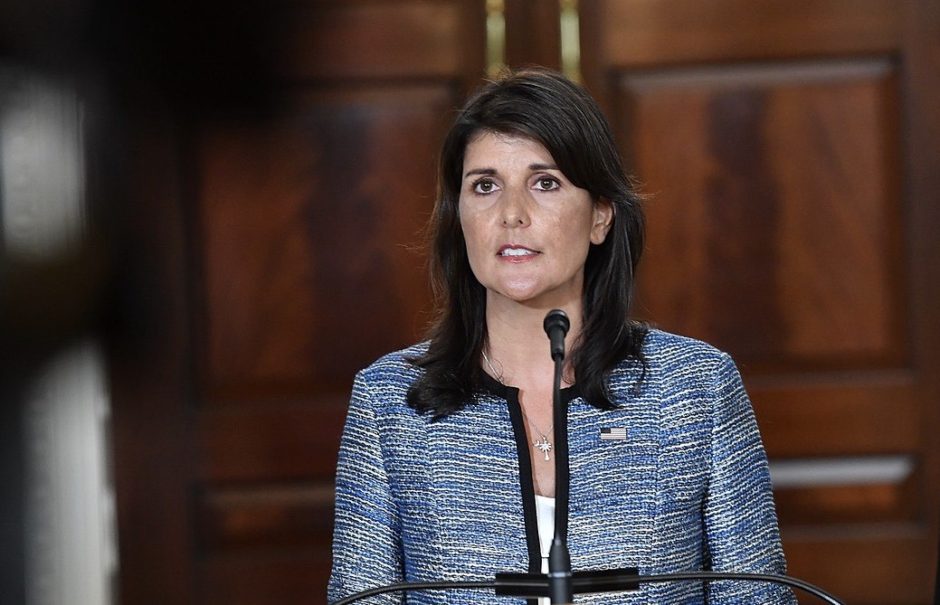Nikki Haley, the U.S. ambassador to the United Nations from 2017 through 2019, had a special place in her heart for Israel.
Like two of her predecessors, Jeane Kirkpatrick and Daniel Patrick Moynihan, she constantly stood up to the UN’s “anti-Israel bias.” This is a theme that runs through her heart-felt and forthright memoir, With All Due Respect: Defending America With Grit And Grace, published by St. Martin’s Press.
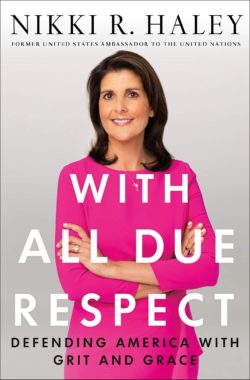
Formerly the Republican governor of South Carolina, the first state in the union to pass legislation to combat the Boycott, Divestment and Sanctions movement, Haley was not an admirer of the UN when she walked through its doors to take up her new post.
What she had seen was “a lot of hypocrisy and dysfunction being tolerated as business as usual,” she writes. She disliked its anti-American tone, its denigration of U.S. allies and its tolerance of injustice. “It’s a place where evil regimes can prevent good people from doing good things through the power of their veto,” she says of the UN’s Security Council.
She accepted President Donald Trump’s employment offer after he agreed to give her cabinet status and a seat on the National Security Council. As a result, she enjoyed “unusual latitude” as ambassador. “I was free to largely chart my own course — and I did.” She admits this was unusual. “But President Trump and I understood each other. I knew my responsibility was to act in accordance with his objectives. And he trusted me enough to allow me to be flexible with how I executed his wishes. He also knew I would be honest with him when I disagreed, and he appreciated that.”
They didn’t always see eye-to-eye, but he always took her calls and always listened respectfully, she notes.
She carried out her duties with Trump’s campaign promises and positions in mind. She called out Russia for its aggression in eastern Ukraine and its illegal seizure of Crimea. She lambasted the Syrian regime of President Bashar al-Assad for its deployment of chemical weapons against rebels in Syria’s civil war. She championed the cause of human rights. And, as she puts it, “We renewed and affirmed our close relationship with our friend and ally Israel. We asserted our sovereign right to move the U.S. embassy to Israel’s capital.”
A Tea Party Republican, Haley is the daughter of Ajit and Raj Randhawa, well-to-do Sikh Indians who immigrated to the United States in the 1960s so that their children would have better opportunities for advancement. “America would show my family discrimination and challenge, but it would also show acceptance and opportunity,” she says.
She was born in Bamberg, a small town in South Carolina. “We were the only Indian American family in my hometown. My father wore a turban, as he does to this day. We were outsiders. We stood out. I remember the stares (and) the suspicion and exclusion.” Years later, when she ran for governor, a white Republican called her a “raghead.”
Haley’s sensitivity to racism convinced her that the Confederate flag on the grounds of the statehouse had to be removed and placed in a museum. This occurred after a white supremacist killed African Americans at a church in Charleston. It was an event that “shattered” Haley and redoubled her commitment to racial equality.
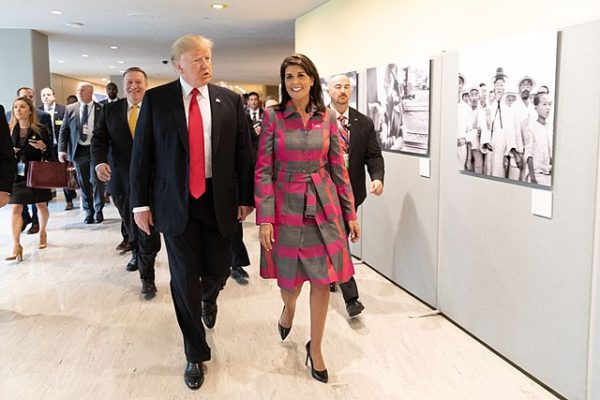
Haley’s acquaintanceship with Trump began in 2010 when he sent her a campaign contribution following her victory in the Republican primary for governor. “After that, I met him several times in New York when I was there on business. He seemed to follow my political career. He would occasionally send me clippings of articles that mentioned me.”
Although she considered him “a serious candidate” for the presidency, she found his sharp rhetoric unappealing and supported one of his rivals, Senator Marco Rubio of Florida. “We just clicked. His story was a my story. He was also the child of immigrants who came to America for a better life. And his flight was my fight.”
After Rubio dropped out of the race, she considered endorsing Senator Ted Cruz of Texas, whom she liked and admired. She does not explain why she stopped short of supporting him. She voted for Trump in the election. “I wasn’t loud about it, but I knew how urgent it was for the party to come together to defeat Hillary Clinton.”
In her view, Trump won because he was blunt and direct, though sometimes rude and offensive, and “said the things that needed to be said.” In other words, she observes, he “connected” with voters.
Eight days after his victory, Trump instructed his chief of staff to ask her whether she would be interested in the position of secretary of state. This job, of course, did not materialize, but Haley readily accepted the ambassadorship to the UN after Trump met her two conditions.
“My first significant lesson in what I would encounter at the UN — the one that affected (me) more than any other — didn’t come from a briefing book,” she says. “Exactly one month to the day after my nomination was announced, the outgoing Obama administration betrayed a friend, and for the worst possible reasons.” She is referring to Obama’s decision to abstain on Security Council Resolution 2334, which declared illegal all Israeli activity in the occupied territories. By failing to veto it, the United States allowed it to pass.
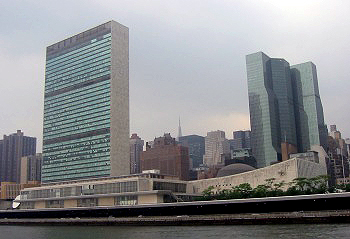
The resolution, passed at the end of 2016 by a wide margin, was “strategically bankrupt as well as morally repugnant,” she claims. In her opinion, it damaged the prospects for peace “by telling the Palestinians they didn’t need to negotiate with Israel.”
The truth is more complicated because Haley does not seem to realize that Israel’s right-wing government has no intention of withdrawing from the West Bank, much less the Golan Heights, and opposes a two-state solution. Haley, though, is convinced that Washington’s failure to veto “this provocation was a disgrace” and “a sad, sad day for the United States at the UN.”
She adds, “Before I came to the United Nations, I didn’t have any particular connection to Israel for the Israeli people. I had never been to Israel or met with any of its leaders. The passage of Resolution 2334 changed that. We had betrayed one of our best friends and closest allies, the only democracy in the Middle East. And we had done so at the United Nations, the place where Israel is continuously scapegoated.”
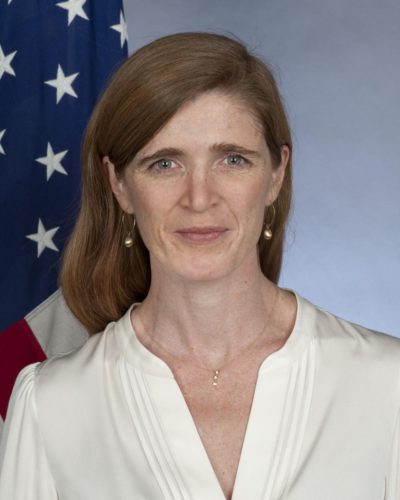
Haley discloses she reached out to her predecessor, Samantha Power, in an attempt to convince her to veto that resolution. Power, who had been “extraordinarily kind and generous” to Haley as she prepared to step into her shoes, did not return Haley’s calls or emails. Branding the U.S. abstention as a “cowardly and useless gesture,” Haley says, “The Obama administration had gone along with the anti-Israel mob.”
She adds, “The passage of Resolution 2334 convinced me that effective support of American interests and values at the UN required steadfast support for countries, like Israel, that share our values. Silence was not an option.”
Haley goes on to say she “ditched protocol” and arranged a meeting with Israel’s ambassador to the UN, Danny Danon, to ascertain what that resolution meant to him. Danon said it had been a humiliating experience. “As Danny told me about it, all I could think was how that feeling was all too familiar to see. I know what it feels like to be different, humiliated and ostracized for being who you are.”
Haley has plenty more to say about the Security Council’s “obsession” with Israel. She believes it has “completely ignored” pressing issues like the Syrian civil war and Islamic State terrorism “to gang up on the only democracy in the region. “The anti-Israel bias at the UN was a so bad that it had actually become part of the culture there … This disproportionate criticism of Israel isn’t the path to peace (but) the path to an endless stalemate.”
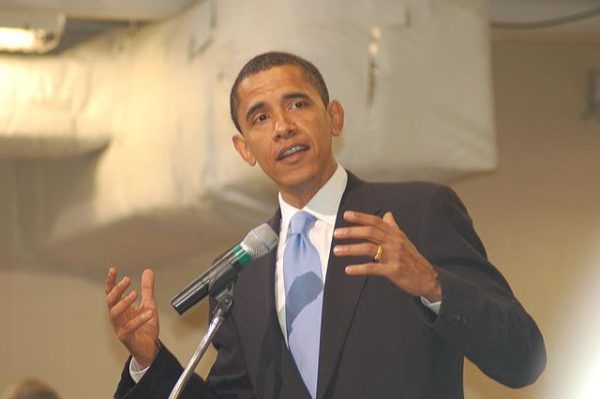
She accuses the Obama administration of having tried harder to “fit in” with the UN’s anti-Israel culture than to “challenge” it.
Being staunchly pro-Israel, Haley fully supported Trump’s plan to move the U.S. embassy from Tel Aviv to Jerusalem: “It was simple common sense. Embassies are located in capitals. In virtually every country in the world, the U.S. embassy is located in the host country’s capital city. Israel should be no different. Jerusalem was already home to Israel’s parliament, president, prime minister, Supreme Court, and many of its ministries.” She acknowledges that “others” in Trump’s cabinet opposed his policy. She vetoed a Security Council resolution condemning the planned embassy transfer, describing the veto as “one of my proudest moments.”
Haley is proud to have convinced Trump to end U.S. funding of the United Nations Relief and Works Agency, which assists Palestinian refugees. In justifying her stance, she writes that UNRWA encourages intergenerational dependency on international aid, tacitly supports the right of return, and distributed textbooks that preach violence and hatred toward Jews.
Like Trump and Israeli Prime Minister Benjamin Netanyahu (who, strangely enough, goes unmentioned in this book), Haley was of the view that the 2015 Iran nuclear agreement was “fatally flawed.” It did not, as Obama claimed, cut off “all of Iran’s pathways to a bomb.” And it “encouraged” the United States and its co-signatories — Britain, France, Russia, China and Germany — to overlook Iran’s support for terrorism and of anti-Israel groups like Hezbollah, Hamas and Islamic Jihad. “The result was a national security threat” and “a disaster for American interests,” she argues.
Haley told Trump he needed to lay out a public rationale for a U.S. withdrawal from the accord. “He eagerly agreed, saying ‘Rex (Secretary of State Rex Tillerson) hasn’t done a f –ing thing on it.'” Emboldened by Trump’s comment, Haley decided to visit the headquarters of the International Atomic Energy Agency in Vienna to discuss the details of the agreement with its inspectors. Tillerson, a supporter of the nuclear agreement, objected to her pending visit. “You need to stay out of it,” he said. Haley ignored his warning.
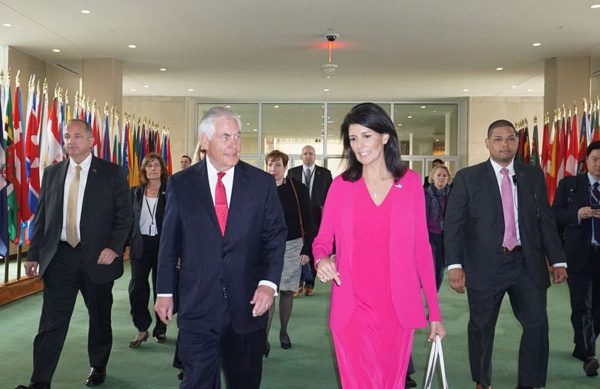
As she admits, she had a fraught relationship with Tillerson, who could be arrogant and condescending. “He gave off the unmistakable impression that he knew more than anyone else in the room — including the president. And I will confess that I have never been good with people who are so convinced of their superiority that they refuse to hear anyone else out. Dealing with Rex could be exhausting.”
She confesses she had two overt disagreements with Trump, neither of which touched on foreign policy.
In the wake of the notorious white supremacist Unite the Right rally in Charlottesville, Virginia, she was “deeply disturbed” by Trump’s “pivot to moral equivalence.” Trump, in his appraisal of the racists and the leftist protestors who squared off at that event, commented there was “blame on both sides.” In Haley’s judgment, Trump did not understand how “damaging,” “hurtful” and “dangerous” his remarks had been. Trump, however, “acted with great sensitivity and appropriateness” after neo-Nazi thugs murdered Jews at synagogue shootings in Pittsburgh and Poway, California.
Haley felt “very uncomfortable” when Trump, at a press conference with Russian President Vladimir Putin in Helsinki, sided with him over allegations that Moscow had interfered in the 2016 U.S. presidential election. Haley told Trump, “The Russians aren’t our friends … and will never be our friends. And you made it sound like we were beholden to them.”
Trump was surprised by her blunt observation. “But I was always honest with the president, even when others around him wern’t.” To his credit, she says, Trump revised his statement and said he “accepted U.S. intelligence agencies’ findings about Russian meddling in the election. I was glad he made that clarification.”
After two years of service, Haley informed Trump she was leaving. “I had taken the job on the condition that I work directly with him and be free to speak my mind. Trump had delivered on his side of the bargain.” She resigned because she was a believer in term limits, wished to spend more time with her family, and could no longer tolerate the high stress levels.
In her summation, Haley turns to Israel once again.
“Some people wondered why I stood up for Israel so strongly at the UN. The truth is, as much as I admire Israel, I would have stood up for Japan, Australia, Canada or Great Britain just as much if they needed it. I stood up for Israel because it is a great ally of the United States and because it gets treated so badly at the UN. Being America’s friend has to mean something. It has to mean we stand up for our friends; and along with that, we expect our friends to stand up for us.”
Haley, who officially left her post last January, does not know what the future holds in store for her future. But she adds this caveat: “I know that if life stopped for me today, I would feel that I have had a blessed life. The idea that a young Indian girl born of immigrants in a small rural town would grow up to be governor of her state and U.S. ambassador to the United Nations is blessing enough. I will never want more, because I have lived a life that’s unimaginable.”
